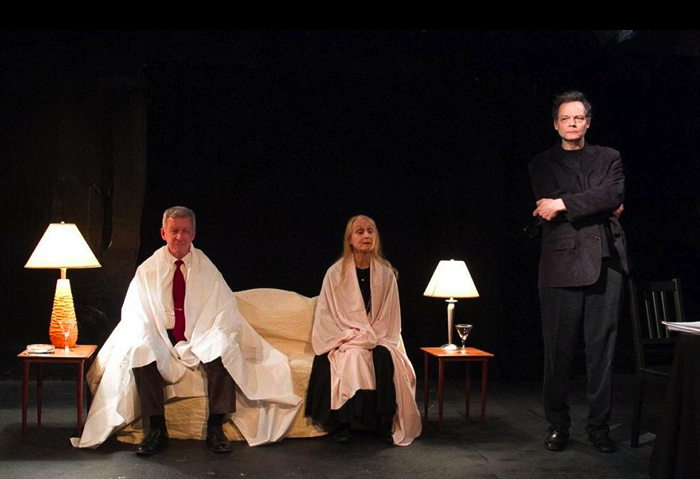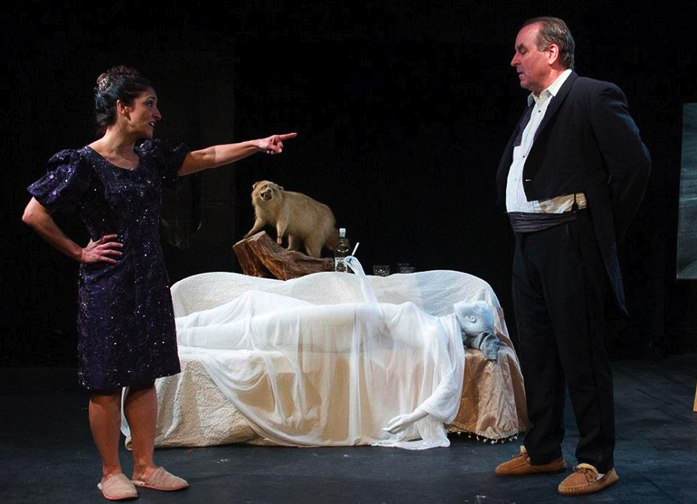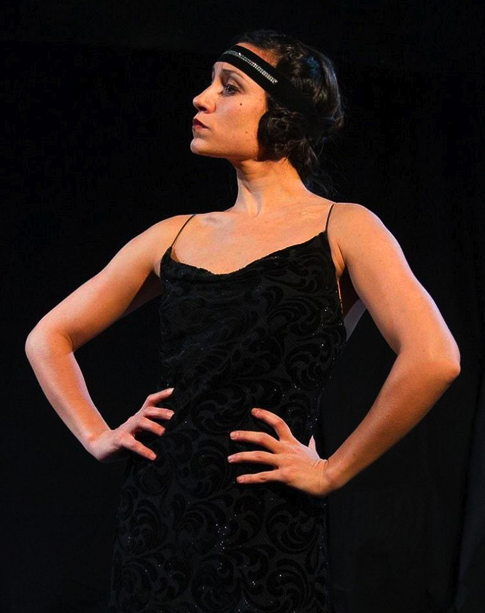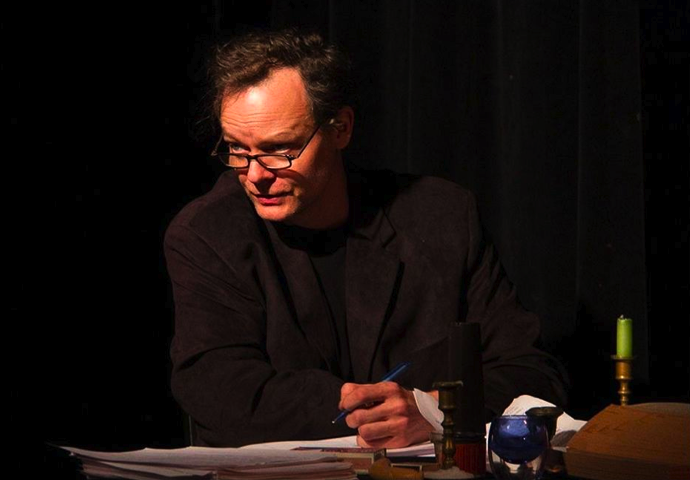Article by Wun Kuen Ng
Photo credit Paul Newland
Lamp Variations is a collection of three separate plays: “Lamp,” “Diorama,” and “Deco,” all written by Theodore McGee and performed at the Access Theatre on 380 Broadway. McGee directed “Diorama” and “Deco” and his friend directed “Lamp.” It will be playing until Sunday, November 2.
Lamp Variations is a volume of three short one act plays with a bend toward theatre of the absurd. Love, possible love, past love, a small war in the background, deceit, memories, the possibility of a little murder with a minor amount of breakage.
Let’s start with “Lamp.” We found it to be the weakest play from the collection. Javier (David Palmer Brown), a butler or master of the house is trying to control Floretta (Anthoula Katsimatides), a girl he picked up. He keeps the house afloat by selling his painting amidst a revolution in the backdrop. There is a lighted mannequin lying on the sofa. It is unclear what the relationship between Javier and Miss Home is. She should have been like the taxidermy albino raccoon, Charlie, Javier brought in.
The tension between Javier and Floretta’s relationship can be felt through the back and forth bullet-like dialogue, even though their words had no cohesion to the story or chemistry between the two actors. Brown mentioned that once he stops making sense of the dialogue, and just delivered the emotional profile of the character, he was able to act and carry it through.
Katsimatides’ acting was not convincing. She seemed stiff in her role. It appeared as if she was uncomfortable playing the character. Later, it was discovered that she was casted last minute and only had three weeks to learn the script as opposed to the five and half weeks the rest of the cast had.
“Deco” was and interesting and dramatic love triangle between three lamps in a lamp shop with imaginative and comedic moments. Fran (Halley Cianfarini), a flapper-style lamp, and Paul (Hugh Sinclair), the dapper socialite is a high-powered society couple. The deco lamp (Mary Sheridan) envies Fran for the relationship she has with Paul. The deco lamp wants Paul, and when the deco lamp does not get what she wants, trouble starts.
The monologue delivered by Sheridan was passionate, but too long. She assumed the sprite of what the lamp represented as this abstract joie de vivre. In the new theatre space, in the angle the light hit the audience; Sheridan delivered her monologue as if the audience was her friend.
The costumes were gorgeous. The flapper dress and the creative deco lamp costumes really transported one to a different time and mood. The deco lamp was in a yellow dress with floating lapel, holding a large clear sphere, and gold fabric draped across the arms.
“Diorama” is our favorite of the three because of it is a strong, original, and organic written play. Emery (Hugh Sinclair) sits at a desk doing his work while his dead parents sits on a sofa in the same room as him, acting as voices in his head. When he turns on the lamp next to his mother, Aero (Marilyn Duryea) begins to speak. When he turns on the lamp next to his father, Price (Richard Vernon) begins to speak. The dramatic story of the family unfolds through the dense dialogue between the three.
Aero and Price do not move and do not leave the sofa throughout the entire play. Actors Duryea and Vernon only use facial expressions to portray the emotions. Vernon commented that acting with no movement or physical contact is difficult. Actors tend to rely on physical objects on stage to help them remember their lines. In this situation, actors must rely on their fellow actors and listen carefully. Vernon said he would listen to Aero and the emotion she plays in order respond back. This method sets the pace and mood of the piece. The three actors did a wonderful job creating the family dynamic.
Given that the play’s focal point is on light, the lightening designer, Isaac Winston used light to illustrate the word, to create an emotional mood, and give the actors a voice to shine. Winston said the new theatre space offered some challenges. There was no control of the overhead. The lighting could have been better but he works with what he is given.
This is McGee first time directing a long piece; he had done short ten minutes pieces before. Usually being a writer, and not a director, McGee discovered that it’s hard to direct one’s own work because of the attachment to the text and difficulty in eliminating superfluous lines. The idea for “Diorama” came about when he sat down to write. The characteristics of Emery popped into his head, he wondered, “What it would be like to turn on the light? Would he be different? Would he lose his inspiration?” There were some strong lines throughout the three short plays. Lamp Variations is funded through his own personal finance. His next work is a full-length play to appear in April/May.
Lamp Variations
Director for “Diorama” and “Deco”: Theodore McGee
Director for “Lamp”: Anon
Lightening Designer: Isaac Winston
Prop Masters: Maureen Sara, Janet Oldenbroek
Costume: Jessica Chen
Graphics: Marlowe Madison
Photographer: Paul Newland





Leave a Reply